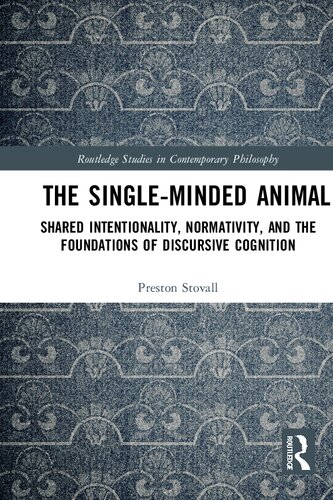

Most ebook files are in PDF format, so you can easily read them using various software such as Foxit Reader or directly on the Google Chrome browser.
Some ebook files are released by publishers in other formats such as .awz, .mobi, .epub, .fb2, etc. You may need to install specific software to read these formats on mobile/PC, such as Calibre.
Please read the tutorial at this link. https://ebooknice.com/page/post?id=faq
We offer FREE conversion to the popular formats you request; however, this may take some time. Therefore, right after payment, please email us, and we will try to provide the service as quickly as possible.
For some exceptional file formats or broken links (if any), please refrain from opening any disputes. Instead, email us first, and we will try to assist within a maximum of 6 hours.
EbookNice Team

Status:
Available5.0
24 reviewsThis book provides an account of discursive or reason-governed cognition, by synthesizing research in the philosophy of language, the philosophy of mind, and evolutionary anthropology.
Using the grasp of a natural language as a model for the autonomous or self-governed rationality of discursive cognition, the author uses a semantics for individual intentions, shared intentions, and normative attitudes as a framework for understanding what it is to be a rational animal. This semantics interprets claims about shared intentions and claims about what people ought and may do as the expression of plans of action that involve taking the points of view of other people within a community. This has important consequences for our understanding of both the natural basis and the social relevance of intentional and normative mental states. In order to distinguish the strong and weak modal force, which characterizes normativity but not shared intentionality, the author argues that a notion of single-minded practical cognition is necessary. This account of single-mindedness is then used to shed light on the autonomy or self-government characteristic of discursive cognition, as manifest in a linguistic community whose members are able to adopt the standpoints of others.
Drawing together research in philosophy and the related sciences, the formal account of the semantic content of the claims we use to give expression to shared intentional and normative mental states integrates well with research in cognitive science, evolutionary anthropology, and social psychology concerning the ontogenetic and phylogenetic development of shared intentionality and norm psychology in human beings and other primates. The Single-Minded Animal will appeal to researchers and advanced students working on shared intentionality, normativity, rationality, cognitive science, social and developmental psychology, and evolutionary anthropology.